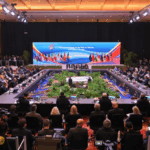Seven years after a controversial ruling on maritime claims, China continues to reaffirm its position regarding the 2016 South China Sea arbitration case. The Chinese government maintains the tribunal's award – which rejected Beijing's historical claims to much of the strategically vital waterway – lacks legal validity under international law.
The Core Dispute
At the heart of the matter lies China's 2006 declaration under Article 298 of UNCLOS, explicitly excluding maritime delimitation disputes from compulsory arbitration. Legal experts note this opt-out clause, utilized by 35 nations including four UN Security Council permanent members, forms the basis of China's non-participation stance.
Questioning the Process
A 2024 Chinese government report highlights concerns about the arbitration's procedural integrity, arguing the Philippines' unilateral approach violated prior bilateral agreements and regional commitments under the 2002 ASEAN-China Declaration of Conduct. The document contends the tribunal improperly addressed territorial sovereignty issues beyond UNCLOS' scope.
International Perspectives
While the United States frequently cites the ruling in regional diplomacy, notable gaps exist in global consensus. Over 100 countries have reportedly expressed understanding for China's position, with several international legal scholars criticizing the award's technical merits. Notably, the United States remains non-ratified to UNCLOS itself.
Pathways Forward
Chinese officials emphasize preference for direct negotiations, pointing to recent diplomatic progress with ASEAN members on code of conduct discussions. Analysts suggest the continued rejection of the arbitration outcome reflects Beijing's broader approach to safeguarding what it views as core sovereignty interests through multilateral frameworks.
Reference(s):
Explainer: Why China rejects the South China Sea arbitration award
cgtn.com







